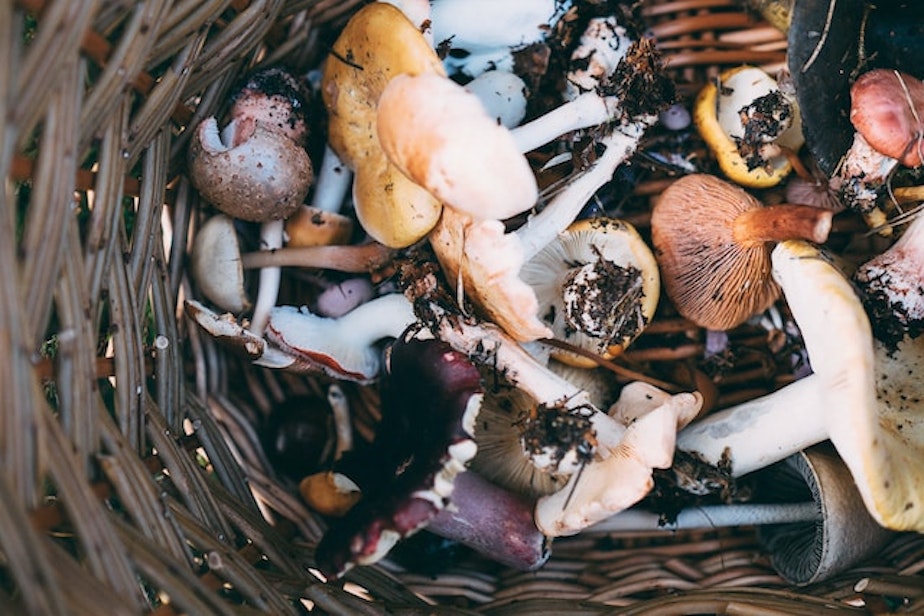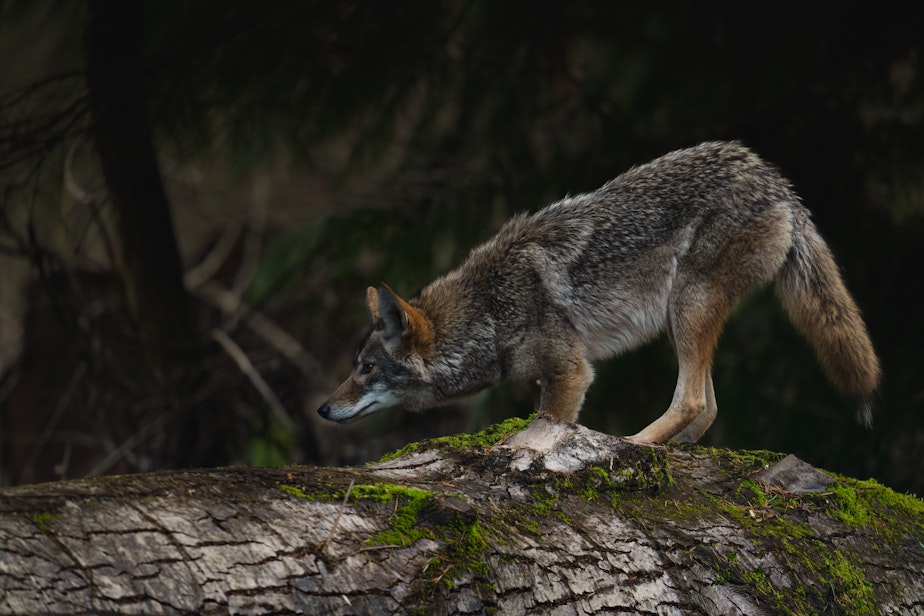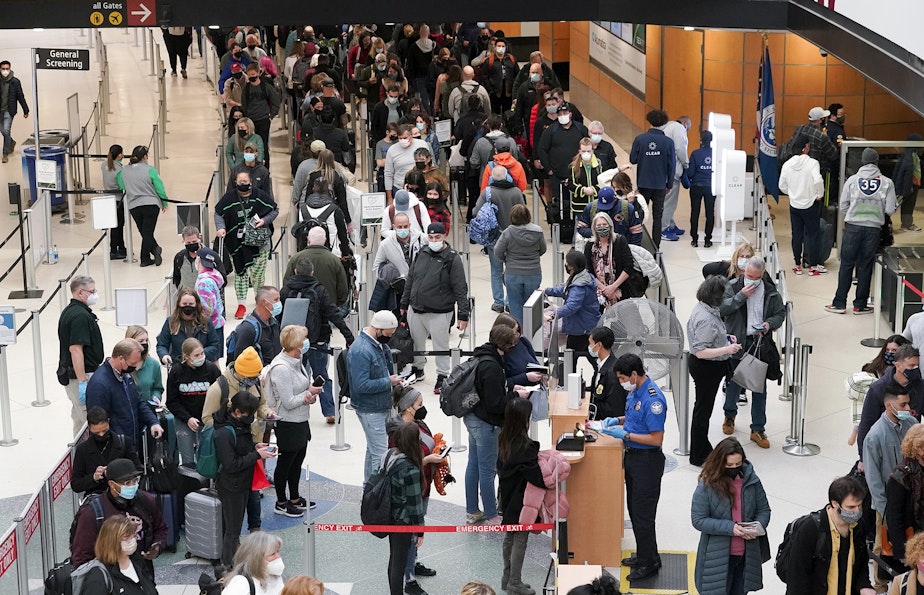Looking for mushrooms in all the right places: Today So Far

- Could magic mushrooms also be magic therapy?
- Spring is prime mushroom foraging season in the Pacific Northwest. Here are a few tips.
- Bellevue has a safe lot for people living in vehicles, but no one is stepping up to run it.
This post originally appeared in KUOW's Today So Far newsletter for May 24, 2023.
Bellevue has a safe lot for folks living in RVs and vehicles. But it doesn't have anyone to run it. This is like having your own airplane to take you where you need to go, but you can't find a pilot.
The city has set aside a piece of land near I-405 in downtown to be the safe lot. It's already being used by a homelessness charity, so it's a known spot, plus it has bathrooms. The city kicked off an effort to set up the safe lot earlier this year and asked for local service providers to apply to manage it ... no one spoke up.
It can be a tall order. A service provider would have to know how to deal with substance abuse disorders, and provide things like job training, etc., plus manage the safe lot where people are living. There are local organizations who can do that, but according to Nico Quijano, Bellevue’s homelessness program outreach manager, such groups are already too busy with their current workload.
"This really highlights the crisis of homelessness in King County and Western Washington. Eastside suburbs have been criticized before for not enough shelters," KUOW reporter Casey Martin told Soundside recently. "When a pretty affluent city like Bellevue steps up and wants to offer half a million dollars for a one-year pilot program to open up a safe parking lot, and they still can't even open this, it really speaks to that — a lot of service providers are a little overwhelmed."
So Bellevue is left sitting on $450,000 for a safe lot pilot program slated to last until 2024. Read more here.
Sponsored
The Washington state Legislature has ordered UW researchers to get people high on mushrooms. OK, not exactly, but you're super curious now, aren't you? Clickbait!
Last session, lawmakers passed a bill that mandates a study into the therapeutic potential of psilocybin. That's the super fun ingredient in magic mushrooms that makes them so magical. There is a growing body of evidence that psilocybin could remedy ailments ranging from depression to addiction. The doses we're talking about, however, are probably far from psychedelic levels that lead to Hunter S. Thompson books, or make it possible to listen to Pink Floyd's "The Darkside of the Moon" all the way through, nonstop.
Instead, what researchers are focused on are ways to treat PTSD and addiction, specifically among military veterans and first responders.
“Our hope is that in targeting this specific population with these two co-morbidities, we could better understand if this could be a viable treatment moving forward,” said Dr. Nathan Sackett, who is currently setting the study up at UW.
Instead of taking the mushrooms and hiking Cougar Mountain or going to a laser show at the Pacific Science Center, participants will get a dose while with psychiatric professionals in a therapy session. There's a bit more to this, so read here for the full story.
Sponsored
Speaking of mushrooms, right now is prime mushroom foraging season in the Pacific Northwest. Today, Seattle Now takes us on a mushroom hunting trip with an expert. Here's a few tips from that trip.
It's important to know what you're looking for when it comes to mushrooms, because while some mushrooms are tasty, others are poisonous. It's also a bad idea to pick mushrooms near polluted areas, like many spots around cities, landfills, mines, railroads, etc. Mushrooms collect heavy metals quite easily.
That's the sort of tips that Daniel Winkler gave KUOW's Patricia Murphy while out on a foraging hike in a forest outside of Redmond. Winkler is author of "Fruits of the Forest: A Field Guide to Pacific Northwest Edible Mushrooms."
"Where there are forests, there are mushrooms," Winkler said. "Mushrooms need moisture and the right temperatures, and they have their own seasonality. So spring has different mushrooms than fall."
Spring is a good time to find morels and oyster mushrooms in our region. That's what Winkler and Murphy (which sounds like a buddy cop sitcom) came across on their recent trip. They also found turkey tails, a mushroom that is not readily edible, but Winkler says it can make a good broth for cooking.
Sponsored
Mushroom foraging often starts by spotting trees. Dead alders are good candidates. Maples too. Red cedars are not such a good sign, because "they don't make mushroom friends as the other trees do," Winkler said.
I have often purchased mushroom kits to grow my own at home ... which are admittedly marketed to children, but I don't care. Apparently, however, I could have just walked over to Redmond, or many other forests scattered throughout our region, and picked some up for free. Check out today's Seattle Now for the full mushroom trip.
AS SEEN ON KUOW

This coyote was spotted across the street from Husky Stadium above Union Bay in Seattle, Wash. In April of 2007, a coyote walked into a Quiznos in downtown Chicago. It walked inside the front door, right into a fast food restaurant full of people. And then, it sat in a soda cooler for an hour. It was an event so rare, it made the evening news. A recent episode of "The Wild" considers the relationships between nature and urban environments. (Matthew Leaman)
Sponsored
DID YOU KNOW?
Fungi, like mushrooms, are often more genetically close to animals than plants. Yep. That mushroom popping up out of the grass is more closely related to you, human, than the grass.
A few decades ago, scientists started to realize that mushrooms don't behave like plants. Mushrooms don't take in sunlight to produce energy. Instead, they take in nutrients, water, and oxygen, and expel waste, like we do. In fact, when exposed to sunlight, mushrooms produce vitamin D, like animals. Mushrooms store energy as glycogen, and so do animals. Plants store energy as starch. Mushrooms have a decent amount of glutamate, a substance which many meats also have, and that might explain why some mushrooms have a more meaty flavor.
Eventually, scientists figured out that mushrooms share about 50% DNA with humans. To put that in perspective, humans share more than 98% of DNA with chimpanzees, and about 90% with cats, 82% with dogs, and 65% with birds.
ALSO ON OUR MINDS
Sponsored

A record number of Americans may fly this summer. Here's everything you need to know
Memorial Day weekend is upon us, kicking off the busy summer vacation season, and airlines are forecasting that this could be their busiest summer ever. Industry projections indicate that despite relatively high airfares, U.S. airlines could carry a record number of passengers this summer, even though they're still operating fewer flights than before the pandemic.

